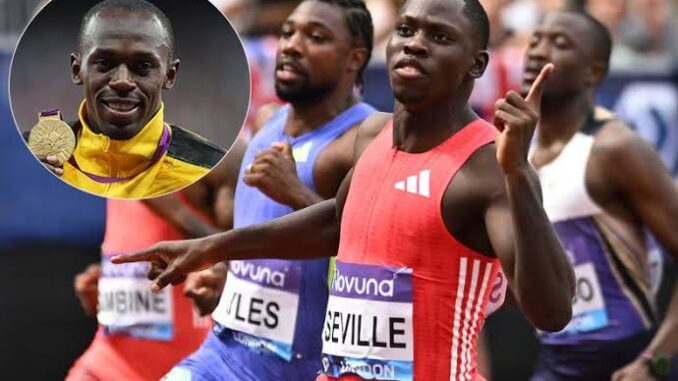
When Usain Bolt speaks, the track and field world listens. The Jamaican legend, whose electrifying speed and larger-than-life charisma revolutionized sprinting, remains a towering figure even in retirement. Recently, Bolt made headlines once again by boldly claiming that no modern sprinter — not even the likes of Oblique Seville or Noah Lyles — will ever break his world records. His words, sharp and confident as ever, have reignited debates among fans, experts, and fellow athletes about whether the world has truly seen the peak of human sprinting speed.
Usain Bolt’s 9.58 seconds in the 100m and 19.19 seconds in the 200m, both set in 2009, have stood untouched for over a decade. Despite the evolution of technology, improved training methods, and stronger competition, no one has even come close to seriously threatening those marks. Noah Lyles, the reigning 200m world champion, has flirted with sub-19.5 territory, while Jamaica’s Oblique Seville has impressed with his consistency and composure on the big stage. Yet, Bolt remains convinced that his records are “safe for life.”
In a recent interview, Bolt laughed off suggestions that today’s generation could surpass his times. “Never!” he declared. “They are talented, yes, but what I did was once in a lifetime. You don’t just wake up and run 9.5. It took years of perfecting every detail — the start, the drive, the relaxation — and a mentality that no one could match.” His statement isn’t arrogance but rather a reminder of the extraordinary combination of talent, work ethic, and showmanship that defined his reign.
Bolt’s confidence stems not only from his natural gifts but also from his era’s unique context. He dominated during a golden age of sprinting competition, consistently facing fierce rivals like Yohan Blake, Tyson Gay, Asafa Powell, and Justin Gatlin — all capable of running under 9.8 seconds. To consistently beat athletes of that caliber required not just physical dominance but psychological supremacy. Bolt thrived under pressure, often delivering his best performances when it mattered most — Olympic finals, world championships, and under the brightest lights.
Meanwhile, Noah Lyles and Oblique Seville represent a new generation striving to redefine sprinting’s limits. Lyles, charismatic and fiercely driven, has expressed his goal of breaking Bolt’s 200m record, while Seville, quiet and disciplined, continues to mature into Jamaica’s next big star. Yet even with their talent, Bolt’s times seem a mountain too steep to climb. Advances in track surfaces, spikes, and training science have only narrowed the gap slightly, proving how extraordinary his feats truly were.
For Bolt, his records symbolize more than just numbers — they are the legacy of an era when sprinting captured the world’s imagination. Every lightning pose, every grin before the gun, and every stride of dominance told the story of a man rewriting human limits. “It’s not just about speed,” Bolt said. “It’s about presence, pressure, and purpose. That’s what people forget.”
Until someone shatters 9.58 or 19.19, the legend of Usain Bolt remains untouchable — a benchmark that continues to define greatness. For Seville, Lyles, and every young sprinter dreaming of glory, the chase goes on. But as far as the Lightning Bolt is concerned, his crown still shines — and will, perhaps, forever.
Be the first to comment